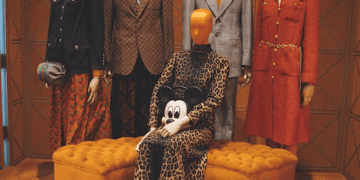In recent years, there has been a noticeable shift in the global fashion landscape as leading Western fashion brands increasingly turn their attention to the East. Asian celebrities, including K-pop idols and Thai actors, are now taking center stage as ambassadors for some of the world’s most coveted luxury fashion houses. This transition raises the question of why Asian celebrities have become the new darlings of the luxury fashion industry.
Fandom Influence K-pop stars have emerged as a significant force in the luxury fashion world, with many acts securing ambassadorships and endorsements from prestigious brands. Some K-pop groups, such as HYBE Labels’ ENHYPEN, LE SSERAFIM, and TOMORROW X TOGETHER, have been granted full-group ambassador status, representing their respective brands collectively. Additionally, individual K-pop group members, like V from BTS, Jennie from BLACKPINK, Jaehyun from NCT, and Hanni from NewJeans, have taken on ambassador roles for high-end fashion labels.
This trend can be attributed to the immense dedication of K-pop fandoms to their favorite idol groups. Fans are known for their strong consumer power, readily purchasing luxury products endorsed by their beloved idols and documenting these purchases on social media, further boosting their idols’ effectiveness as endorsers. South Korea, in particular, stands out as the world’s largest spender on luxury goods, with a 24% spending increase in 2022, totaling $16.8 billion, according to investment bank Morgan Stanley.
Social Media Impact While not all K-pop fans may be able to afford luxury goods, their contributions to their favorite artists’ ambassadorships extend beyond mere purchases. The powerful impact of K-pop stars on social media cannot be overstated, as they generate substantial Media Impact Value (MIV), a metric used to assess the monetary value of public posts, digital media, and interactions stemming from their involvement with fashion brands.
For example, ENHYPEN generated $7 million in MIV for Prada during the debut of Prada’s Spring/Summer 2024 collection at Milan Fashion Week. BLACKPINK’s Jisoo’s appearance for Dior in the same month generated $6.5 million in MIV. These figures illustrate the substantial online influence of K-pop stars. Thai actors and actresses have also made a significant impact, with figures like Win Metawin and others contributing millions of dollars in MIV to luxury brands during Milan Fashion Week events.
Social media’s dominance in various Asian regions, such as the Philippines, where social media usage ranks high, further amplifies the impact of K-pop and Thai television series fandoms.
Perfect Alignment The choice of brand ambassadors goes beyond quantitative metrics and numbers. Luxury fashion houses seek ambassadors who align with their brand’s identity. For instance, Loewe selected NCT’s Taeyong as their global brand ambassador due to his unique personal style and love of fashion. Bally chose SEVENTEEN’s DK as their global ambassador, emphasizing his casual elegance and global charm.
Ambassadors enjoy numerous perks, including front-row seats at fashion shows, participation in global campaigns, and access to both archival and fresh-off-the-runway pieces from their brands’ collections. This alignment ensures meaningful collaborations that resonate beyond the numerical achievements.
For example, Dior’s partnership with BLACKPINK’s Jisoo led to the creation of a new Dior Lip Addict shade inspired by the star. Gucci’s collaboration with EXO’s Kai on the Gucci X KAI capsule collection was a huge success, with the collection quickly selling out and increasing the brand’s search queries by over 200%.
The Increasing Role of Asian Celebrities While ambassadorships play a significant role in luxury fashion involvement, brands also engage with Asian celebrities and influencers in various ways before endorsing them. During fashion weeks in Milan, local celebrities like Liza Soberano, Andrea Brillantes, and Pia Wurtzbach graced the front rows of luxury brand shows, further boosting their MIV rankings.
This trend is not limited to K-pop stars and Thai actors, as Filipino celebrities, like Heart Evangelista, have gained prominence in the luxury fashion scene. It reflects the industry’s desire to connect better with its Asian audience and suggests that more Filipino and Asian stars may be considered for ambassadorships due to their aspirational lifestyles and measurable impact.
As Asian audiences continue to express their interest in luxury brands, the fashion industry is likely to continue featuring Asian celebrities at the forefront of their brands. Through the combination of dedicated fandoms, social media impact, and a strong alignment with brand values, luxury fashion houses can enhance their reach and customer relationships with the assistance of Asian celebrities from various regions.
Catch the latest in supply chain news on The Supply Chain Report. Visit ADAMftd.com for free international trade tools.
#LuxuryFashion #KpopInfluence #AsianCelebrities #FashionAmbassadors #ENHYPEN #BLACKPINK #BTS #KpopIdols #FashionInfluence #SocialMediaImpact #ThaiActors #LuxuryBrandAmbassadors #Dior #Gucci #Prada #Loewe #SEVENTEEN #EXO #MIV #FashionWeek #MilanFashionWeek #FandomPower #AsianFashionScene #CelebrityEndorsements #CulturalShift #LuxuryTrends #AsianInfluence













